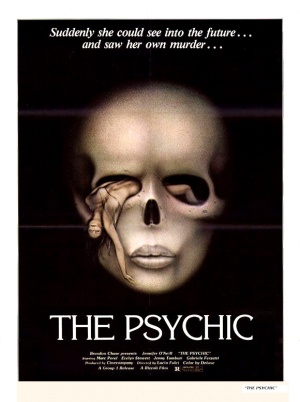 This restrained seventies-era thriller was one of the final movies made by Italy’s late Lucio Fulci before he gave himself over largely to gore fests like ZOMBIE and THE BEYOND. It’s pretty good, too: well plotted, suspenseful and engrossing.
This restrained seventies-era thriller was one of the final movies made by Italy’s late Lucio Fulci before he gave himself over largely to gore fests like ZOMBIE and THE BEYOND. It’s pretty good, too: well plotted, suspenseful and engrossing.
THE PSYCHIC (1977), known in Europe as SEVEN NOTES IN BLACK, or SETTE NOTE IN NERO, was initially released in heavily cut form in America (i.e. with the opening cliff fall shorn of its gory close-ups). Like many Italian films of the time, it was seemingly “inspired” by an American-made precursor, in this case the 1975 psychic-themed chiller THE REINCARNATION OF PETER PROUD (which also featured this film’s above-the-title starrer, model-turned-bad actress Jennifer O’Neill). And the cribbing didn’t stop there, as THE PSYCHIC was remade (with music numbers!) as the 1991 Bollywood extravaganza 100 DAYS.
THE PSYCHIC, alas, was a box office flop, and widely viewed as a lesser film in the Fulci cannon. It has, however, undergone a resurgence in recent years, due largely to Quentin Tarantino, who raved about in it in an interview in Giallo Pages and used a music cue from the film in KILL BILL: Vol. 1.
In a small beachside town a young woman commits suicide by jumping off a cliff, during which portions of her face are sheared off by the rocky Cliffside. This is all psychically witnessed by the woman’s young daughter.
That girl grows up to be the statuesque Virginia, who’s still tormented by horrific psychic visions. Those visions, apparently of a past murder, lead her to break down a wall in her house, on the other side of which is a skeleton. That skeleton, Virginia learns, was once a fashion model who disappeared four years earlier, and whose face Virginia recognizes from a magazine cover glimpsed in one of her visions.
Using imagery from those visions, Virginia gradually pieces together the particulars of the woman’s murder, which is being blamed on her husband. Virginia for her part comes to believe that the real culprit may be a local old man. But as she delves deeper into the case, Virginia comes to realize that her visions are actually from the future rather than the past…and that the victim may just be herself!
Numerous Lucio Fulci trademarks can be found herein, notably the many fast zooms into the lead actress’ eyes as a signal of her psychic visions (likely inspired by CARRIE); eyes came to define Fulci’s films in later years. The many hallucinatory interludes recall the dream sequences of Fulci’s psychedelic thriller A LIZARD IN A WOMAN’S SKIN (1971), while the opening suicide was recycled from the unforgettable conclusion of Fulci’s DON’T TORTURE A DUCKLING (1972), and the explicit nod to Edgar Allan Poe’s “The Black Cat” made even more so in Fulci’s 1981 film of that title.
This is a lively and colorful film, albeit largely plot-driven. It’s a far cry, in other words, from the expansive sleaze fests that characterized Fulci’s later years. The strong script boasts a well-constructed mystery with quite a few unexpected twists. As a director Fulci wisely lets that mystery take center stage, although he does include a few over-the-top flourishes of the type for which he’s come to be known (the opening suicide, with its close-ups of the jumper’s face lacerated by rocks, being the most prominent of those flourishes). Plus, in the lead role Jennifer O’Neill is attractive and (surprisingly) dramatically able.
Of course, this is a 1970s era Italian film, meaning there’s much you’ll have to forgive: awful English dubbing, a noisy and intrusive score, and much distracting overuse of the zoom lens. But if you can handle those things you’ll find an unerringly entertaining thriller that ranks with Lucio Fulci’s best films.
Vital Statistics
THE PSYCHIC (SETTE NOTE IN NERO/SEVEN NOTES IN BLACK)
Rizzoli Films
Director: Lucio Fulci
Producer: Franco Cuccu
Screenplay: Lucio Fulci, Roberto Gianviti, Dardano Sacchetti
Cinematography: Sergio Salvati
Editing: Ornella Micheli
Cast: Jennifer O’Neill, Gabriele Ferzetti, Marc Porel, Gianni Garko, Evelyn Stewart, Jenny Tamburi, Fabrizio Jovine, Riccardo Parisio Perrotti, Vito Passeri, Loredana Savelli, Salvatore Puntillo, Luigi Diberti
